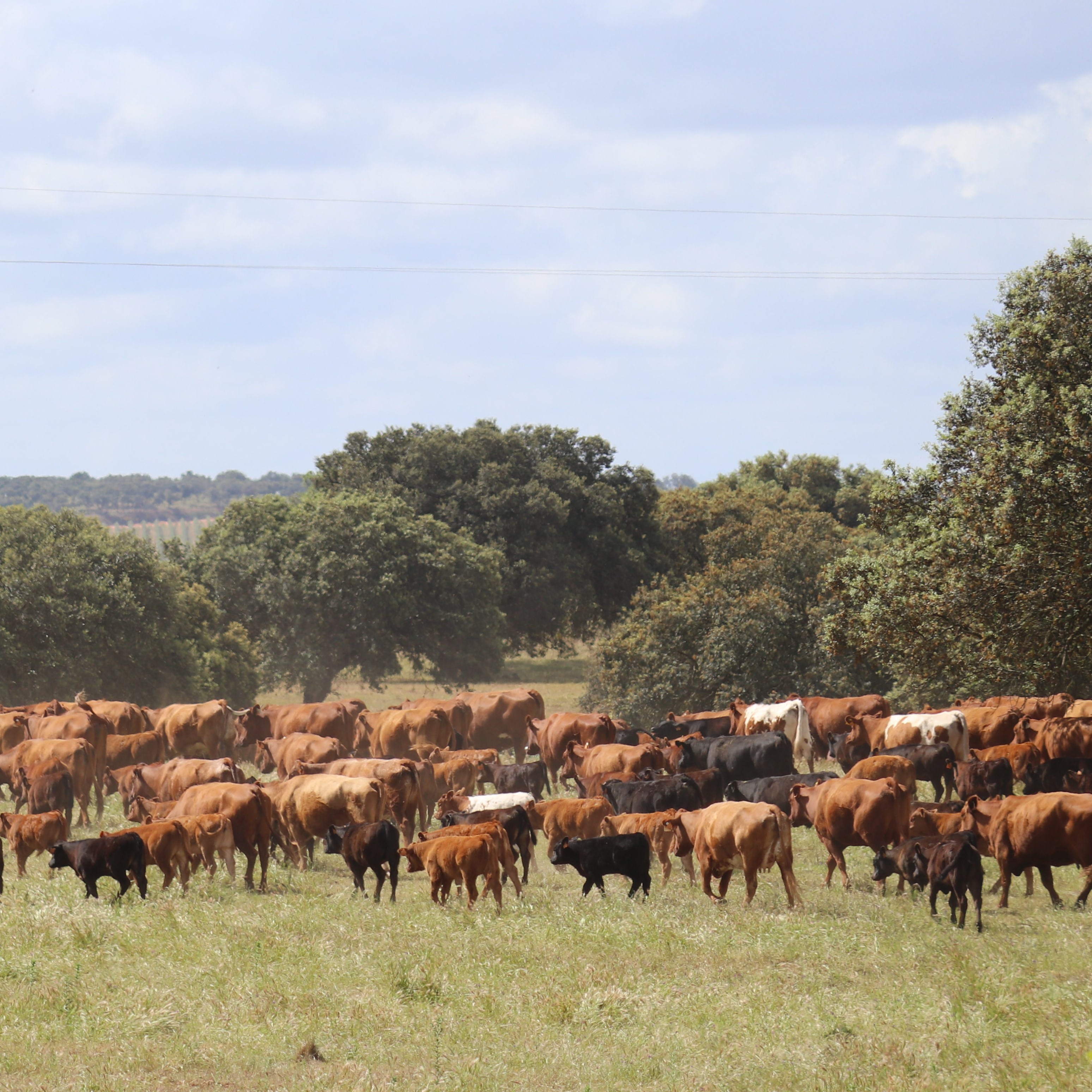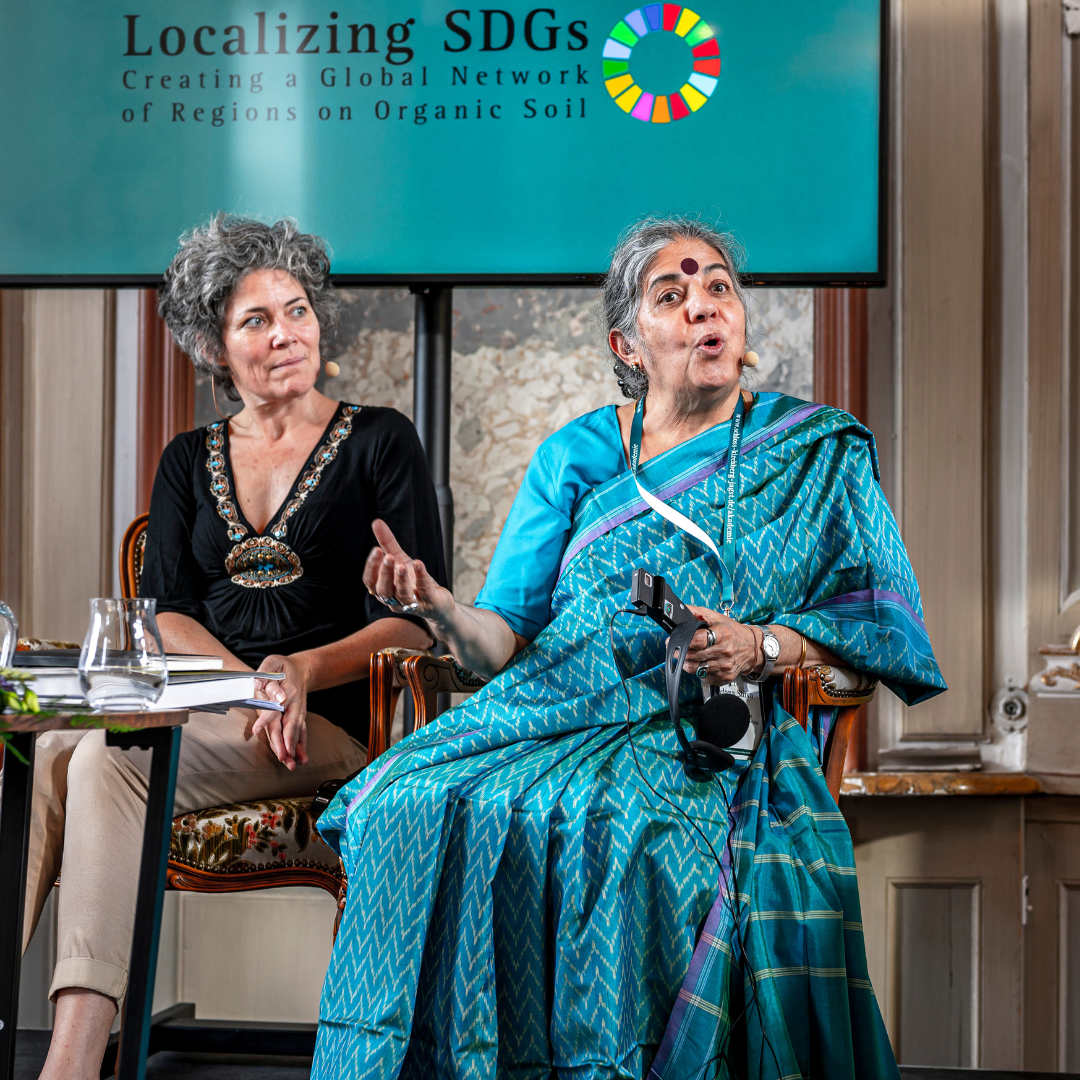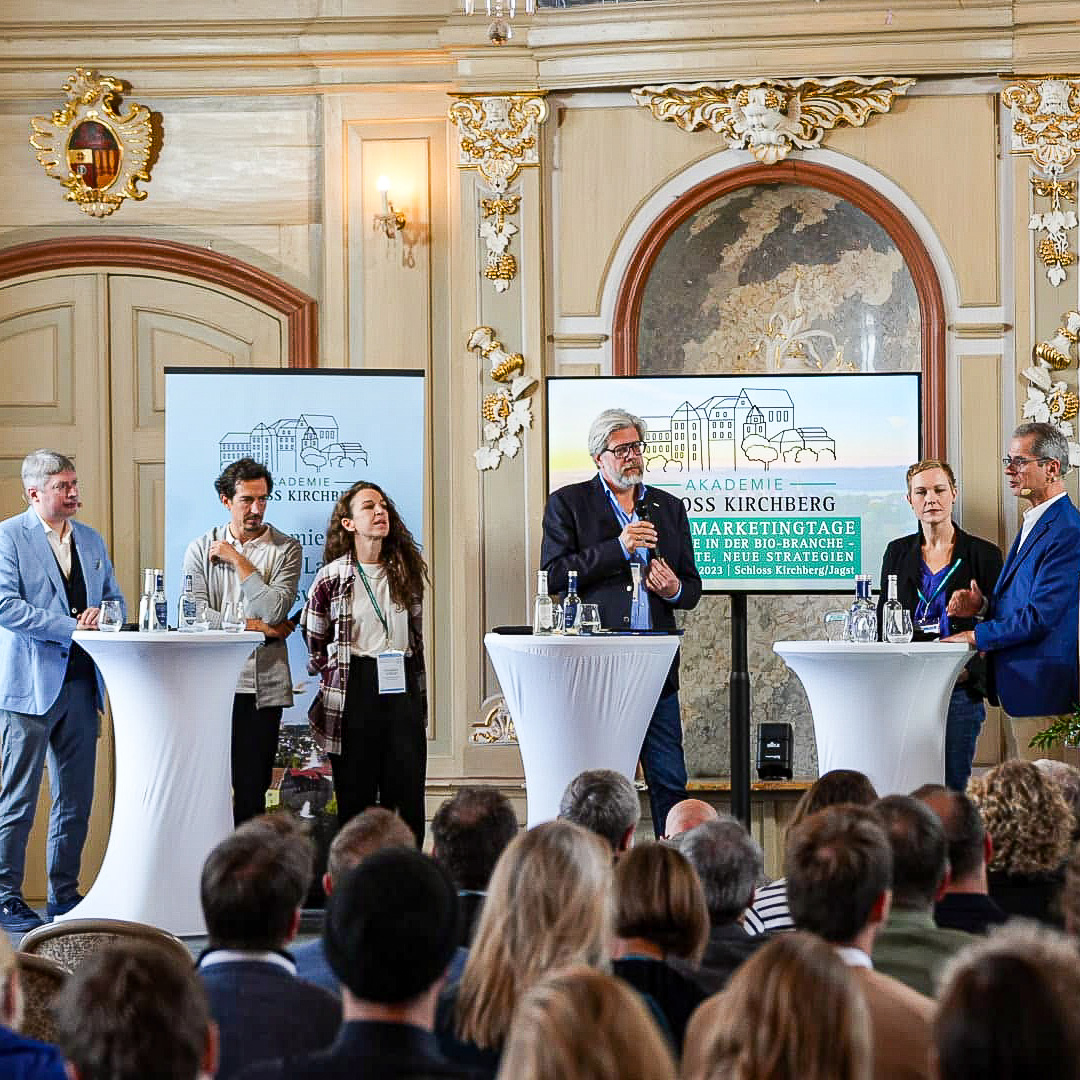„The Akademie für ökologische Land- und Ernährungswirtschaft Schloss Kirchberg (Academy for Organic Agriculture and Food)
is a nucleus for the further development of organic agriculture in Germany.“
Rudolf Bühler, Founder and Chairman of the Foundation House of Farmers
In recent years, the Akademie Schloss Kirchberg has evolved into a meeting place for farmers, civil society activists, leaders, representatives of indigenous communities, policy makers and young changemakers along the entire agricultural value chain from field to fork. Since the beginning of its work, networks have been established to reach the diverse audience with the core topics. Existing expertise is to be shared and new expertise gained through valuable partnerships. The Akademie Schloss Kirchberg facilitates the necessary transfer of knowledge.
Montag, 1. Juli bis Mittwoch, 3. Juli 2024
Future of Food: Organic – Regenerative – Agroecological?
Das World Organic Forum ist eine entwicklungspolitische Konferenz auf Schloss Kirchberg, die mehrere Tage in Kirchberg an der Jagst in Deutschland stattfindet. Die Akademie Schloss Kirchberg (Akademie für Ökologische Land- und Ernährungswirtschaft) befasst sich neben entwicklungspolitischen Aspekten zunehmend auch mit agrarwirtschaftlichen und agrar-kulturellen Aspekten im Rahmen der Agenda 2030.
Das VII. World Organic Forum 2024 wird sich auf die Trias des ökologischen Landbaus, der regenerativen Landwirtschaft und der Agrarökologie fokussieren. Zentral werden wir uns mit der Frage "Future Food Systems: Organic - Regenerative - Agroecological?" beschäftigen.
Bundespräsident verleiht Professor Dr. Franz-Theo Gottwald Verdienstkreuz am Bande – Überreichung in München
Professor Dr. Franz-Theo Gottwald, Direktor der Akademie für ökologische Landund Ernährungswirtschaft Schloss Kirchberg, ist in München mit dem Verdienstkreuz am Bande des Verdienstordens der Bundesrepublik Deutschland ausgezeichnet worden. Der promovierte Philosoph und diplomierte Theologe hat die Leitung der Akademie für die Stiftung Haus der Bauern, dem Sozialwerk der Bäuerlichen Erzeugergemeinschaft Schwäbisch Hall, zu Jahresbeginn 2022 übernommen.
In der Laudatio würdigte Thorsten Glauber, bayerischer Staatsminister für Umwelt und Verbraucherschutz, Franz-Theo Gottwalds Engagement in der Wissenschaft, in Beratung und Kommunikation für eine nachhaltige Agrar- und Ernährungswirtschaft. „Ihr Anliegen ist ein verträgliches Miteinander von wirtschaftlichen und gesellschaftlichen Interessen, ein gutes Leben, in dem Arbeit und Technik in Einklang mit der Natur gebracht werden“, sagte Glauber, „dafür arbeiten Sie im Beruf und im Ehrenamt.“

Climate Farming
We want to contribute to promoting the great potentials and powerful levers of farm-based agriculture on the path to global climate resilience. The way agriculture is practiced - from our stewardship of the soil and on-farm ecosystems, to the way we raise animals and grow crops, to the way we process and consume food - offers many effective options for shaping the future. Neutralizing CO2 emissions, preserving and increasing biodiversity, and bringing measurable economic and ecological added value to the upkeep of farm structures are fields of action that have already been realized in many places. In practical seminars, excursions and at conferences on this topic, we contribute to the development and dissemination of knowledge and network farmers with civil society, business and politics.
see e.g. Climate Farming Conference (under Impressions)

Localizing SDGs & Localizing Global Peasants‘ Rights
We are working closely with Bäuerliche Erzeugergemeinschaft Schwäbisch Hall and the organic farming movement to achieve the Sustainable Development Goals as part of the United Nations' 2030 Agenda. Under the motto "Localizing SDGs", we are building a global network of regions where the SDGs are being grounded and brought to life by farmers, representatives of indigenous communities, civil society activists, experts and politicians through their respective agricultural, sustainability, cultural, legal or social practices. The representatives of the SDG regions in the global South, North, East and West as well as experts from think tanks, NGOs, foundations and governments meet once a year at Kirchberg Castle for the exchange of experiences and mutual knowledge transfer at the World Organic Forum - the development policy conference platform for the global localization of the SDGs!
see World Organic Forum (under Impressions)

Organic sustainability along the value chain
It is of great interest to us to contribute to the sustainable development and ecologization of food value chains between agricultural production, processing in craft and industry, trade and consumption with stimulating event formats designed for the exchange of experience and knowledge. We bring together farmers, representatives of the food industry, the organic sector, decision-makers in politics and young changemakers in seminars, excursions, at conferences and in innovative formats - from small grocery stores to nationally positioned retail groups, from CEOs to farm successors and trainee groups in supermarkets.
see e.g. Öko-Marketingtage, Fachkraft Bio, Sommerschule (under Impressions)
Harmful and toxic trace substances find their way into streams and rivers all over the country because they cannot be removed by sewage treatment plants. Prof. Dr. Rita Triebskorn, ecotoxicologist and ecophysiologist from Tübingen, will be speaking about this on Monday, July 29, from 7 p.m. in the Rittersaal in Kirchberg. Graduate engineer Horst Geiger will make it clear that it is economically feasible for municipalities to eliminate a large proportion of these substances with a 4th treatment stage - with only a small increase in charges in cents per cubic meter. He helped plan and supervise the installation of the 4th treatment stage in Öhringen. The event is organized by the Akademie Schloss Kirchberg.
From August 5 to August 19, the International Master Class of Chamber Music with artists from all over the world takes place at Schloss Kirchberg. On four dates during this period, visitors will be able to enjoy first-class concerts by international musicians in the castle's historic Knights' Hall. The annual course has been offering master students excellent further training in chamber music and solo instruments by renowned professors for 20 years. For this year's anniversary, the musicians will again fill the rooms of the historic castle with their beautiful music for two weeks. Kyoko Hashimoto, professor of piano, from McGill University in Montreal (Canada) has led the course since the beginning and this year is joined by Professor Herwig Zack on violin and Professor Ramon Jaffé on cello.
The public concerts, each with a different program, take place on the following dates:
Sunday, August 11 at 5 p.m.
Wednesday, August 14 at 7.30 p.m.
Saturday, August 17 at 7.30 p.m.
Sunday, August 18 at 17.00.
Admission to all concerts is free. Donations are welcome.
Another concert will take place as part of the Hohenloher Kultursommer:
Thursday, August 15 at 6:30 p.m. in the concert room at Schloss Aschhausen
programme and tickets for concerts of the Hohenloher Kultursommer
Joint event with the Association of Organic Food Producers (AöL)
Information will be shared soon

